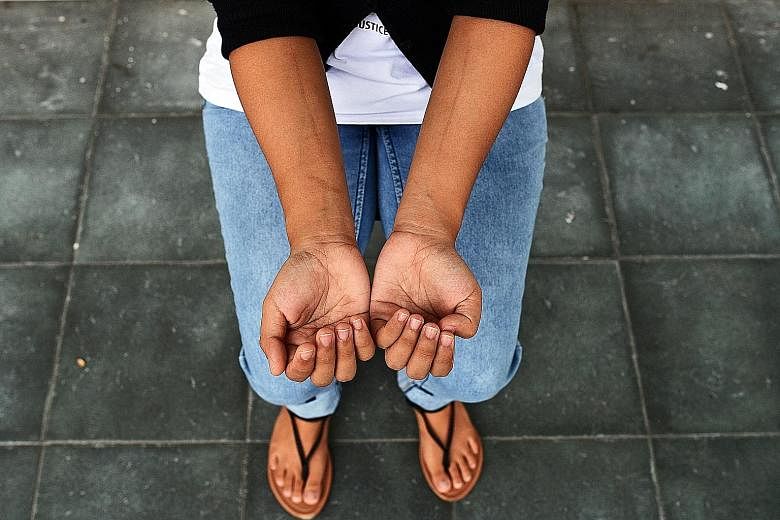Two dark scars run the length of Indonesian maid Desi Perawati's forearms. These are reminders of wounds allegedly inflicted by her former employer who, in a fit of rage, used a porcelain chip to etch her arms, she claims.
But activists involved in her case say she was not just a victim of abuse, but also of labour trafficking - a crime which attracts heavier punishment.
Since Ms Desi's alleged ill-treatment took place in December, it cannot be prosecuted under the Prevention of Human Trafficking Act (PHTA), which came into force only in March.
But both the Ministry of Manpower (MOM) and experts say the door is open for cases in the future.
It was on her third day of work at a three-storey terraced house in Sunshine Terrace when the incident took place, according to Ms Desi. She had used a plate meant for her employer's young son to cover the top of a cup of coffee.
"Madam got angry and said the plate belonged to Baby. She took it, hit my face, and the plate broke," recalled Ms Desi. Her employer then used a chip from the plate to cut her arms, she alleged.
That was not all she supposedly endured. In her six days there before she ran away, she claims she was kicked and had her face smashed against a wall, and her hair roughly cut against her will.
Ms Desi is now being sheltered by the Humanitarian Organisation for Migration Economics (Home).
The case has been reported to police and investigations are ongoing. But the non-governmental organisation has also referred the case to the Inter-Agency Taskforce on Trafficking-in-Persons (TIP). Set up in 2010, the taskforce includes agencies such as the Ministry of Home Affairs and MOM.
Ms Tam Peck Hoon, head of advocacy and awareness at Home, noted that Ms Desi's case bears similarities to two other trafficking cases which were referred to and accepted by the taskforce last year.
"(These women) might be forced to work due to threats or penalties, illegally confined, or abused such that they are considered to have been deceived about the nature of work or their work conditions," said Ms Tam.
Ms Desi was allegedly made to sign a fresh contract at her employment agency after she came to Singapore in November. Instead of the $520 monthly pay that had been agreed on in Indonesia, she had to settle for $450.
Such forced contractual changes are a common indicator of trafficking, said Ms Tam.
Ms Desi's case would be dealt with under "pre-existing legislation such as the Penal Code and the Employment of Foreign Manpower Act", said MOM. But similar cases in the future could be dealt with under the PHTA.
The private member's Bill was mooted by then MP Christopher de Souza in 2013, and passed in November last year.
"The Attorney-General's Chambers (AGC) decides on the cases to be prosecuted under the PHTA. To make out a human-trafficking offence, the State Prosecutor must be satisfied that all three elements of "act, means and purpose" are met, said an MOM spokesman.
The AGC declined to comment, but lawyer Mark Goh explained that TIP involves, for instance, the recruitment or harbouring (act) of a person through fraud or threat of force, among others (means), for the purpose of exploitation.
This can include sexual exploitation or forced labour.
"You cannot conclude that every maid-abuse case will satisfy all three criteria. But that does not mean that maid-abuse cases are not TIP," said Mr Goh.
This bears serious consequences for offenders - punishments for human trafficking are much harsher. First-time offenders can be fined up to $100,000, jailed for up to 10 years and caned a maximum of six strokes. In comparison, for causing hurt, offenders can be jailed only up to three years and fined up to $7,500.
"Ordinary Singaporeans must be aware that they may be complicit in trafficking which carries a heavy penalty," said Ms Tam.
The Sunday Times visited the home where Ms Desi used to work, but the employer's father denied that his daughter had been abusive. "What reasons would we have to hit her? This is outrageous," said the 62-year-old , although he did admit seeing blue-black bruises on Ms Desi's face after her third or fourth day with the family. Asked how the bruises happened, he said: "How would we know?"


